7 Best Community Platforms for Universities in 2026

TL;DR
- What it enables: Universities create vibrant digital communities that enhance student engagement and foster meaningful connections beyond coursework.
- What it includes: Event management tools, student organization hubs, centralized communication channels, and peer networking capabilities.
- Key elements: AI-powered features, mobile accessibility, integration capabilities, customizable branding, and comprehensive analytics dashboards.
- Top 7 platforms for 2026 include: Disco, Mighty Networks, Circle, Slack, Discord, Kajabi, and Bettermode.
- Why it matters: These platforms streamline campus operations while building stronger academic communities that support student success.
Why Online Community Platforms Matter for Universities
Online community platforms give universities practical ways to bring people together. These platforms encourage interaction that goes beyond coursework, allowing students to engage socially, share knowledge, and collaborate more effectively. For faculty, they can provide spaces to exchange ideas and coordinate departmental efforts.
They also serve as a central hub for events, clubs, and co-curricular activities, helping universities organize and promote initiatives that enrich the campus experience. With specialized group spaces, departments can connect more easily, student clubs can thrive, and alumni networks can stay active and informed.
Ultimately, online community platforms help create a vibrant sense of belonging. Whether it’s connecting students with mentors, supporting academic discussions, or strengthening alumni ties, these platforms enable universities to cultivate relationships that enhance the academic experience for everyone involved.
Key Benefits of Implementing a University-Focused Community Platform
A university-focused community platform simplifies the complex web of campus life, making every interaction more intuitive, connected, and impactful. Event planning becomes seamless, with tools that handle everything from creating and promoting events to managing registrations and tracking attendance. Whether it’s orientation week or graduation, the process feels effortless, allowing more time to focus on creating memorable experiences.
For student organizations, the platform acts as a simplified management hub. Clubs and societies can organize their memberships, communicate with members, and coordinate activities through a single, user-friendly space. This eliminates administrative headaches and empowers student leaders to focus on fostering engagement and connection.
Communication, often fragmented across emails and apps, becomes centralized and streamlined. Announcements, discussions, and updates are shared in one accessible hub, ensuring clarity and reducing the noise of scattered channels. Whether students are collaborating on group projects or faculty are sharing departmental updates, the platform ensures that everyone stays aligned and informed.
The platform also creates opportunities for deeper connections and growth. Peer networking and mentorship are built into its framework, enabling students to connect with classmates, faculty, and alumni in meaningful ways. Leadership development becomes an organic part of the experience, helping students build skills and relationships that extend beyond their time at university.
Discover the most innovative community platforms for academic institutions in 2026
Universities looking to foster vibrant, connected communities can benefit greatly from these platforms. From AI-powered tools to seamless collaboration features, here are the top platforms reshaping campus engagement.
| Platform | Best For | Main Features | Pricing |
|---|---|---|---|
| Disco | AI-powered community engagement | AI-driven prompts, analytics, Slack/Zoom integrations, branded academies | $359/month for small organizations |
| Mighty Networks | Mobile-first community building | Activity feed, live events, ambassador programs, integrations | Starts at $41/month |
| Circle | Organized virtual communities | Segment-based spaces, Q&A forums, visual customization, private messaging | Starts at $89/month |
| Slack | Communication and collaboration | Channels, real-time messaging, app integrations, searchable history | Free plan; Pro starts at $8.75/month |
| Discord | Real-time collaboration | Custom voice/chat rooms, live collaboration tools, cross-platform access | Free plan; Nitro starts at $9.99/month |
| Kajabi | Monetized learning communities | Integrated payments, marketing automation, community spaces | Starts at $149/month |
| Bettermode | Structured community hubs | Custom spaces, API/webhooks, event hosting, analytics dashboards | Pro starts at $49/month |
Disco
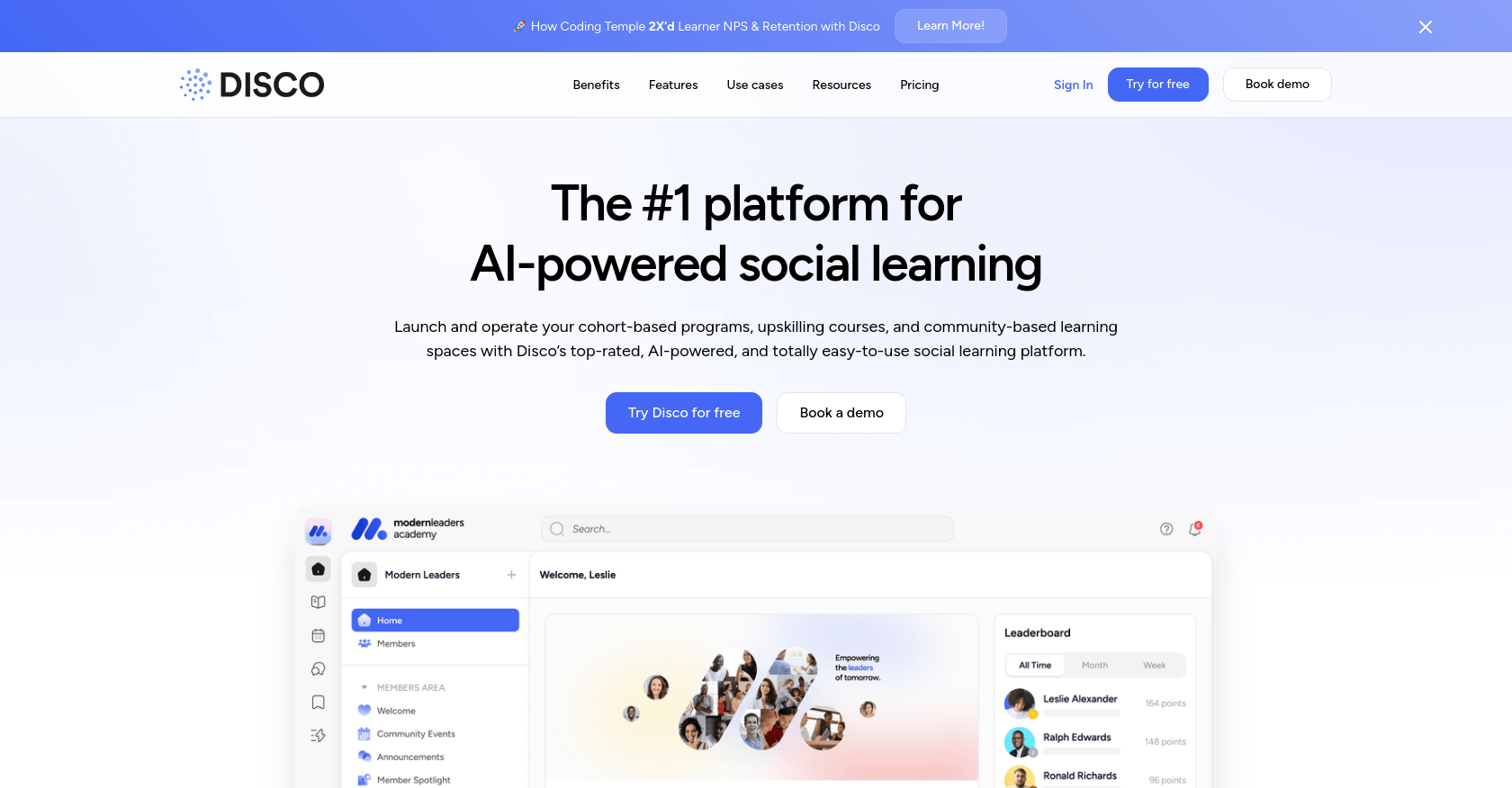
Disco is where learning and connection come together seamlessly. Built for organizations that want to combine education with community, it simplifies the work of creating engaging, branded experiences. From AI-driven course creation to real-time engagement tools, Disco equips educators and administrators with everything they need to design programs that not only inform but inspire.
The platform’s AI capabilities make managing learning environments smoother than ever. Whether it’s updating course content, automating reminders, or suggesting event ideas, Disco helps teams focus their energy on creating meaningful connections. Its white-labeled design ensures that every interaction feels personal and aligned with your institution’s identity—because learning should always reflect the culture behind it.
Key Features
- AI-Enhanced Engagement: Generate community prompts, answer learner questions, and notify participants about events automatically, ensuring no opportunity for interaction is missed.
- Powerful Analytics: Gain visibility into participation rates and engagement trends, allowing for continuous improvement and informed decision-making.
- Seamless Integrations: Native compatibility with tools like Zoom, Slack, and payment platforms ensures that everything works together without extra effort.
- Streamlined Administration: A centralized dashboard simplifies the management of courses, groups, and events, giving academic teams more control with less complexity.
Disco combines innovative design with intuitive tools to help you create learning programs that engage, adapt, and evolve effortlessly. It’s not just about keeping up—it’s about building experiences that stand out.
Mighty Networks
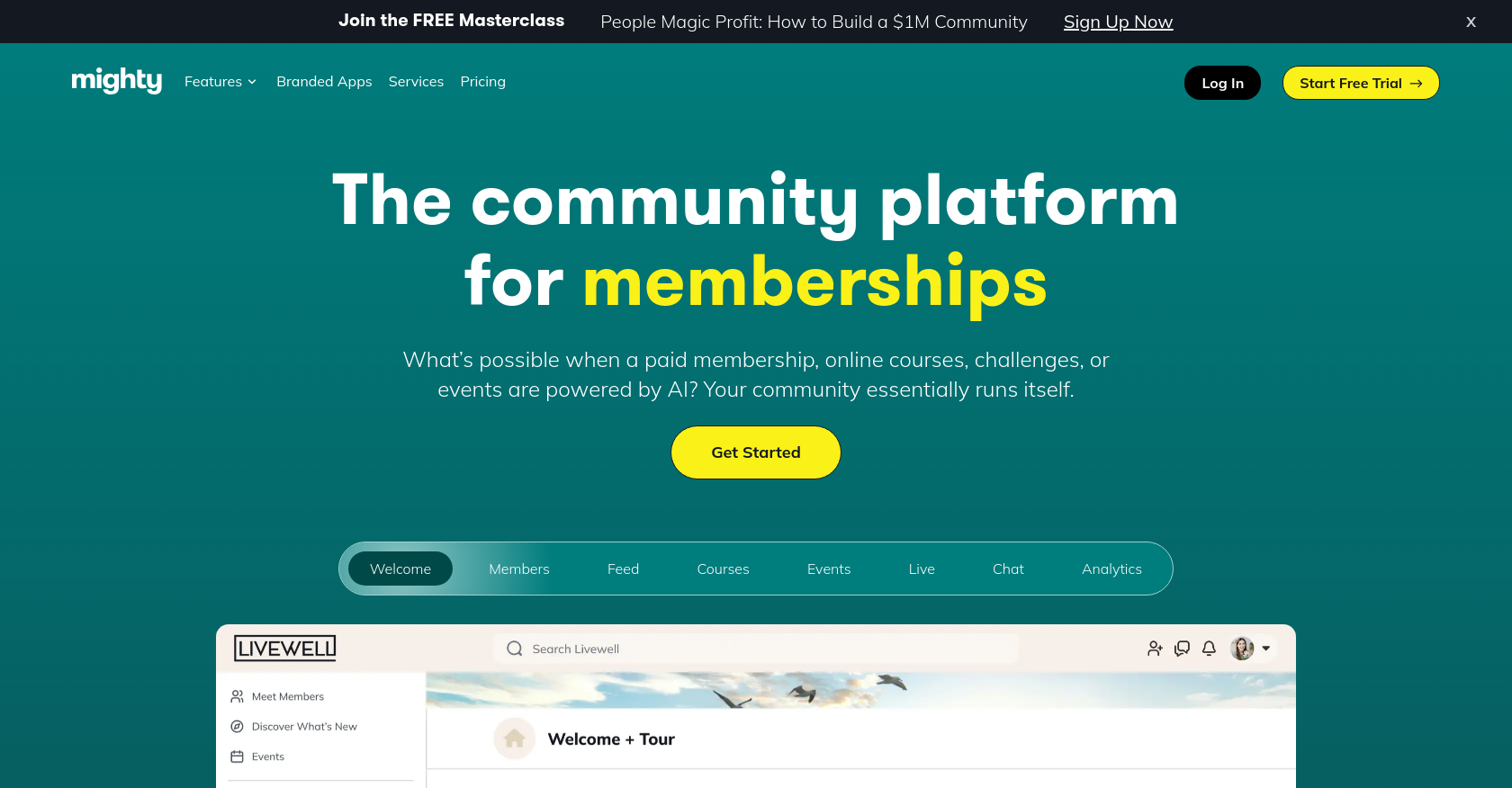
Mighty Networks has carved out its space by focusing on interactive community building with a structure that supports both flexibility and engagement. Designed to cater to continuing education programs and academic cohorts, the platform ensures members can actively connect and collaborate in a way that feels seamless and organized.
With a mobile-first design, learners and leaders alike gain instant access to content, updates, and discussions—making it simple to stay engaged wherever they are. This mobility reflects a commitment to keeping learning experiences accessible and in sync with today’s fast-paced environments.
Key Features
- Activity Feed: A central hub where members can stay informed, interact with content, and customize their profiles to create a more personal connection within the community.
- Live Events & Discussions: Tools for hosting virtual gatherings or group discussions that foster real-time collaboration and engagement.
- Ambassador Program: Built to encourage peer involvement, this feature allows select members to take an active role in driving community participation and energy.
- Analytics: Provides basic insights into activity trends, helping leaders track engagement and adjust their approach in real time.
Circle
Circle is designed to bring clarity and connection to virtual communities, offering a straightforward way to organize spaces for collaboration, discussion, and learning. Whether it’s course discussions, student clubs, or departmental forums, Circle’s platform adapts seamlessly to the unique needs of universities and learning institutions.
Circle helps keep communication flowing with real-time notifications, ensuring even the busiest learners stay informed without delay. Its segmentation tools allow administrators to create distinct, private spaces for specific groups, providing a tailored experience for every audience. With these tools, learning communities can focus less on logistics and more on fostering meaningful engagement.
Key Features
- Segment-Based Access Controls: Assign roles and permissions for group-specific spaces, ensuring discussions and resources are always relevant to the right members.
- Embeddable Community Widgets: Integrate forums, updates, or shared resources directly into campus websites or intranets for a seamless, centralized experience.
- Visual Customization: Match the platform’s aesthetics to institution branding, reinforcing a cohesive, professional identity across all interactions.
- Q&A and Group Spaces: Create structured environments for collaborative problem-solving, mentoring, or faculty-student discussions, supporting deeper connections between members.
Slack
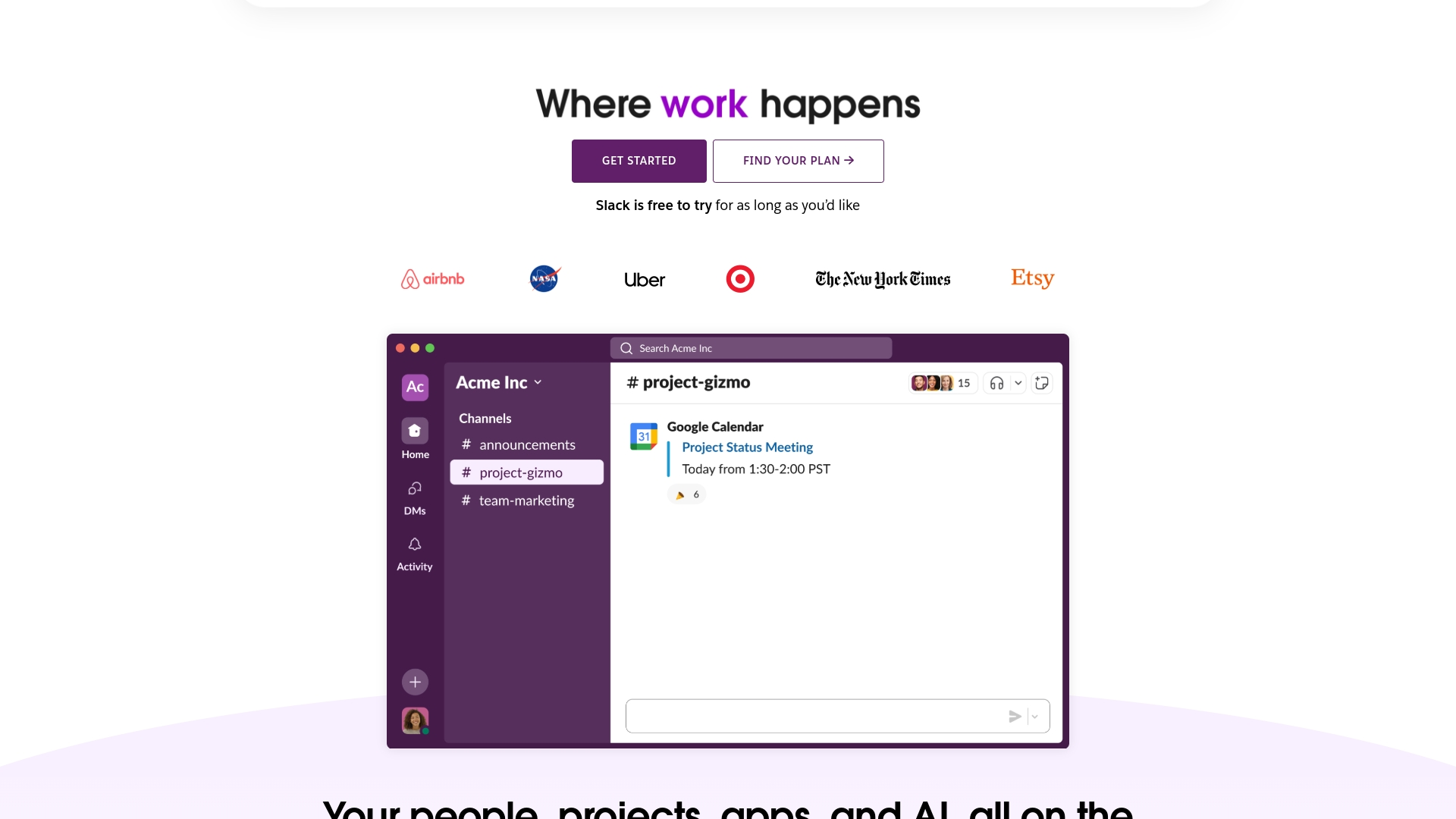
Slack has evolved from a workplace collaboration tool into a versatile platform that supports a wide range of learning environments. Universities, research labs, and student organizations have embraced it as a hub for communication and coordination. Its channel-based structure organizes conversations by topic or project, ensuring that even the most complex discussions stay clear and on track.
What makes Slack practical for learning is its seamless ability to integrate with productivity apps like Google Drive and Microsoft Teams. Whether it’s sharing files, pinning important resources, or catching up on a conversation, Slack keeps teams synchronized without interrupting their momentum. By combining real-time messaging with robust search capabilities, it turns collaboration into a smooth, intuitive process.
Key Features
- Channels: Focused spaces for specific topics or projects, keeping discussions streamlined and relevant.
- Real-Time Messaging: Instant communication that adapts to fast-paced schedules, reducing delays.
- Searchable History: Quickly find past conversations, documents, or links without wasting time.
- Integrations: Connects with thousands of tools to centralize workflows and reduce context-switching.
- Limited Customization: Offers a consistent interface, though branding options are minimal.
Discord
Discord introduces a unique way to foster real-time collaboration and connection, particularly for communities seeking immediacy and interaction. Originally known for serving gaming groups, Discord has evolved into a versatile platform that empowers student organizations, project teams, and academic communities to communicate seamlessly. Its voice channels create spaces where groups can interact fluidly, whether they’re brainstorming ideas, hosting virtual meetups, or working on shared goals.
What makes Discord effective for diverse teams is its ability to adapt to different organizational structures. Roles and permissions can be customized to define access levels, ensuring that each member can participate meaningfully while maintaining structure and clarity. With mobile and desktop apps, Discord ensures that communication remains accessible and uninterrupted, no matter where users are.
Key Features
- Tailored Spaces for Every Group: Custom voice and chat rooms allow teams to create dedicated hubs for student societies, study groups, or collaborative projects, ensuring everyone has a clear place to contribute.
- Tools for Community Organization: Built-in moderation tools, such as verification levels, help maintain a safe and well-managed environment for participants.
- Engaging Live Collaboration: Features like screen sharing and voice lounges make it simple to lead live discussions, share insights, or co-create solutions without switching platforms.
- Seamless Accessibility: With cross-platform functionality, users can transition effortlessly between devices, ensuring they stay connected and engaged wherever they are.
Kajabi
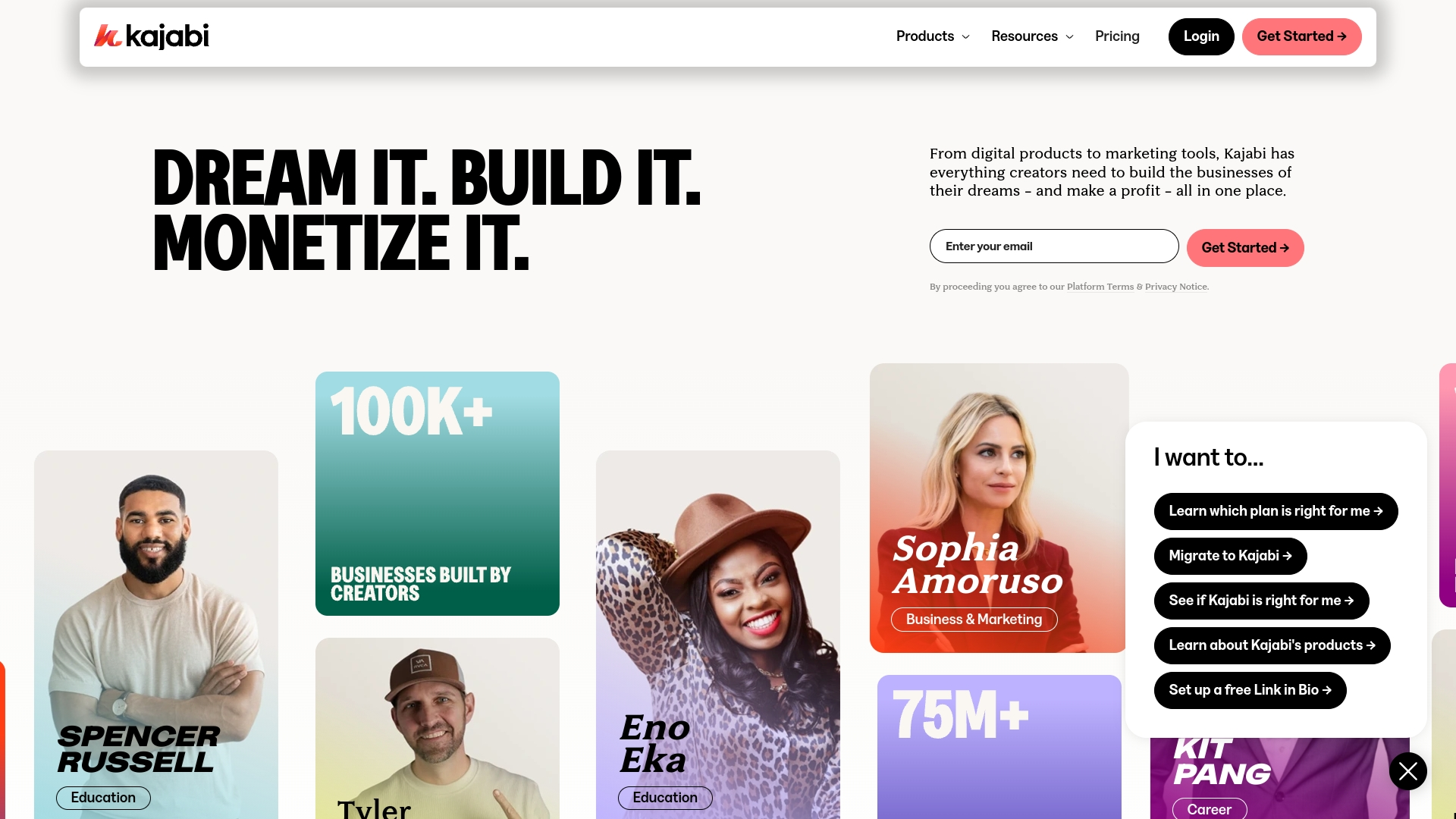
Kajabi has carved out a niche for online course creators and is increasingly making its way into higher education, particularly in college extension programs. Its strength lies in combining learning tools with robust monetization features, making it a practical choice for continuing education initiatives where revenue generation is a priority.
With features like integrated payment gateways and marketing automation, Kajabi helps simplify the business side of education. From email campaigns to landing pages, the platform equips educators with tools to attract and grow their audience while delivering content. However, its community features, while useful, may feel limiting for institutions managing larger, more complex learning ecosystems.
Key Features
- Simplified Payments: Supports smooth transactions through built-in gateways, ideal for paid programs and memberships.
- Integrated Marketing Tools: Includes email automation, funnels, and landing pages to streamline learner acquisition and engagement.
- Community Space: Offers discussion tools for learner interaction, though scaling these for larger groups may require additional workarounds.
- Branding Options: Customization is available, but more advanced branding tools are locked behind higher pricing tiers.
For programs focused on monetization and manageable scale, Kajabi offers a comprehensive toolkit. However, for organizations prioritizing advanced community engagement or extensive branding control, it may require additional investment to achieve the desired experience.
Bettermode
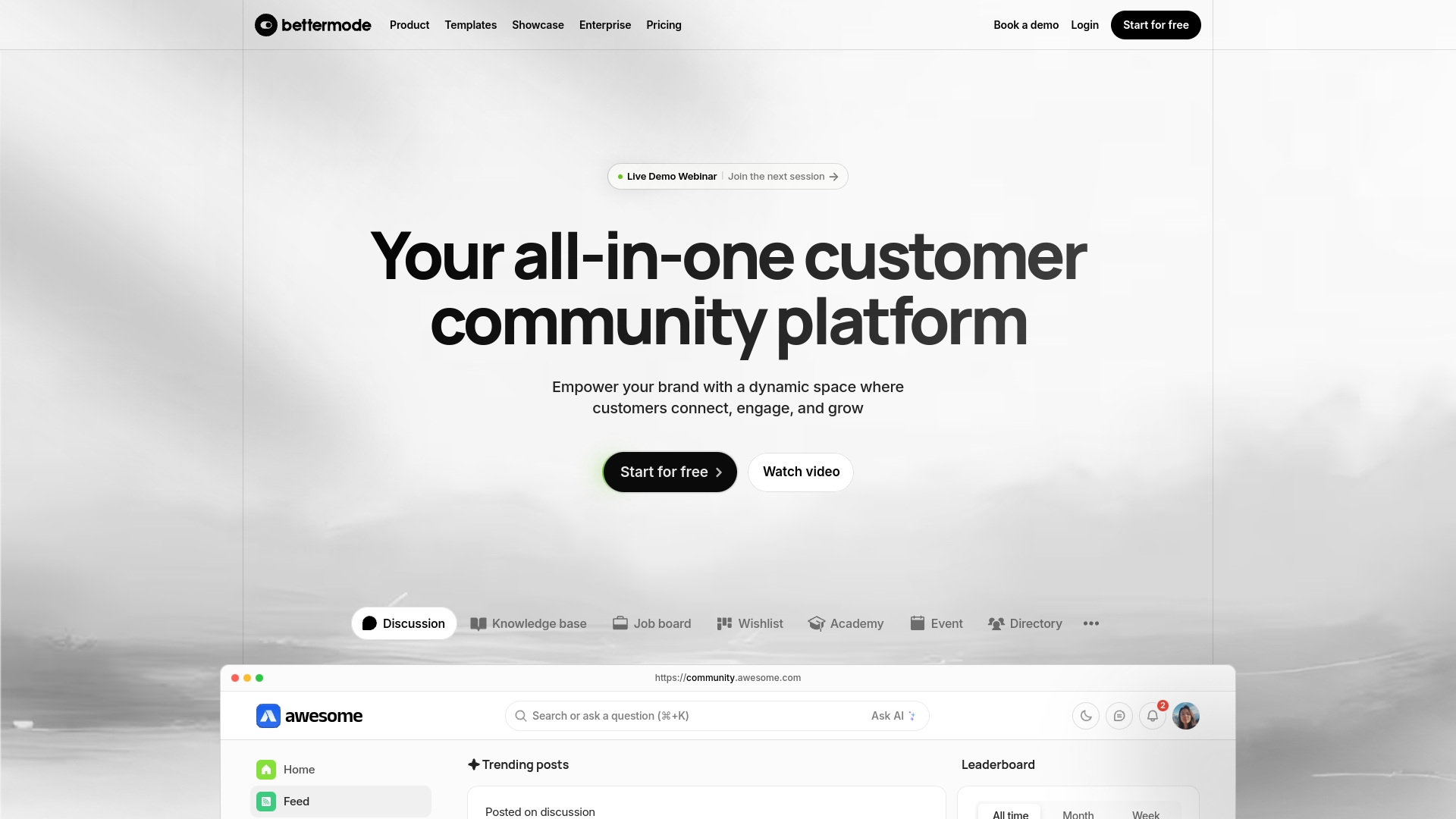
Bettermode brings structure and flexibility to building brand-led communities, offering a practical solution for fostering engagement in environments like university clubs or departmental groups. Designed with simplicity and adaptability in mind, it creates spaces where collaboration and communication thrive, all within a framework that feels intuitive and organized.
With its moderation tools, Bettermode helps maintain order and safety while allowing creativity to flourish. For educational settings, this means creating an environment where students, faculty, or alumni can connect meaningfully without distractions or disruptions. It’s a platform that balances functionality with ease, making it accessible for administrators and community members alike.
Key Features
- Built-in Templates: Simplify community setup with pre-designed options for organizing content, from discussions to events, saving time while keeping everything cohesive.
- API and Webhooks: Seamlessly integrate the platform with existing campus systems, ensuring a smooth and connected digital experience for all members.
- Event Hosting: Streamline planning and participation with RSVP features, making it easy to manage everything from small group meetings to large-scale events.
- Reporting Dashboards: Gain insights into activity and trends with visual analytics, helping you understand what’s working and where there’s room to adjust.
Stepping into the New Era of Campus Community
AI is reshaping how universities connect students, staff, and faculty, offering tools that go beyond traditional communication to create dynamic, collaborative environments. By integrating technology with social interaction, campuses can foster vibrant ecosystems where learning and connection thrive. Digital community platforms are the cornerstone of this shift, bringing clarity and cohesion to campus operations while enriching the student experience.
When choosing the right platform, it’s essential to focus on what matters most to your institution. Is it seamless branding? Data-driven insights? Or perhaps the ability to integrate tools for streamlined collaboration? Platforms like Disco combine AI-powered course creation, community engagement, and operational automation into one cohesive solution—tailored to the unique needs of higher education. Want to see how it works? Book a Demo today to explore the possibilities.









